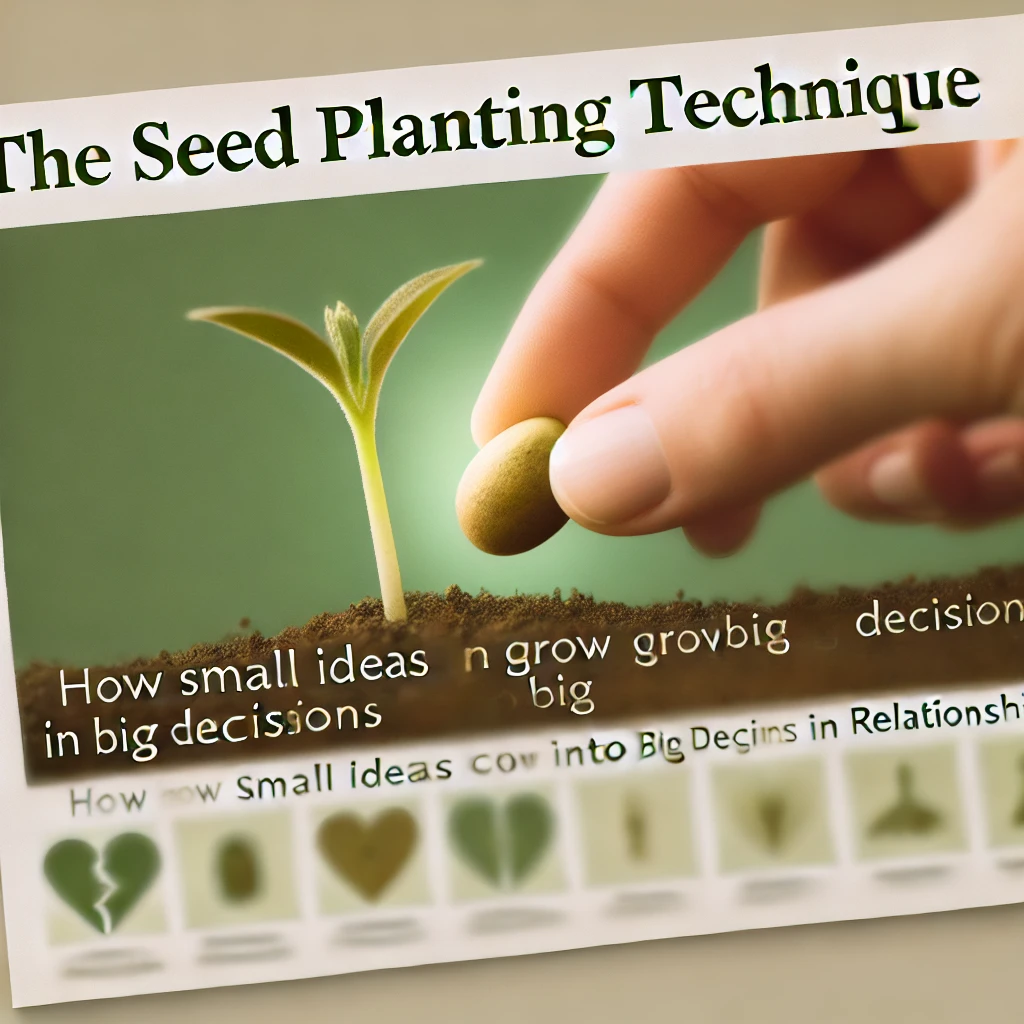In any relationship, one of the most powerful tools you have at your disposal is the ability to influence your partner’s thoughts and behaviors without confrontation or overt persuasion. Enter the Seed Planting Technique, a subtle yet incredibly effective method for guiding your partner toward decisions or actions without them ever realizing they’re being led. Just like planting a seed in fertile soil, this technique works by gently introducing ideas that, over time, take root and grow into full-fledged desires or decisions in your partner’s mind.
The beauty of the Seed Planting Technique is that it’s a soft, non-intrusive way of influencing behavior. You’re not asking for anything outright; instead, you’re merely offering a suggestion, planting a thought that your partner will mull over and, eventually, may come to believe is their own idea. The technique taps into the natural human tendency to reflect on and internalize ideas, especially when they aren’t presented as demands or direct requests.
In this blog, we’ll dive deep into how the Seed Planting Technique works, why it’s so effective in relationships, and give you practical, relatable examples of how you can use it to influence your partner’s decisions over time. By the end, you’ll see how this subtle strategy can help you create the outcomes you want without conflict or resistance.
What Is the Seed Planting Technique?
The Seed Planting Technique is a subtle form of influence where you introduce an idea in a gentle, non-forceful way, allowing it to grow in the other person’s mind over time. Instead of immediately pushing for a decision or action, you simply “plant the seed” of an idea and let it naturally take root. Over time, as the idea settles in, your partner may begin to think about it more, gradually warming up to the idea or even believing it was their own.
The key to this technique is patience. You’re not looking for an immediate result, but rather letting the idea grow organically. Over time, as your partner becomes more comfortable with the thought, they’re more likely to act on it or suggest it themselves.
Why Does the Seed Planting Technique Work?
The Seed Planting Technique works because it respects the natural psychological process of internalizing and reflecting on information. When people feel like they’ve arrived at a decision on their own, they’re more likely to commit to it. By planting a seed, you allow your partner the space and time to process the idea without feeling pressured or cornered.
Humans are also more open to ideas when they don’t feel like they’re being forced to adopt them. A gentle suggestion, left to linger in the back of their mind, feels non-threatening. Over time, as the idea comes up again in their thoughts, they may begin to warm up to it, allowing it to take root in their mind without the resistance that comes with direct persuasion.
How to Use the Seed Planting Technique in Relationships
Now that you understand the psychology behind this method, let’s explore how you can use the Seed Planting Technique in various relationship scenarios. These examples will show how simple, subtle ideas can influence major decisions over time.
Example 1: Encouraging Healthier Habits
You’d like your partner to adopt healthier habits, but pushing them to go to the gym or eat better hasn’t worked in the past. Instead of nagging, you can use the Seed Planting Technique to plant the idea of healthier choices.
How to Use the Seed Planting Technique:
Next time you’re together, casually mention a small fact: “I was reading an article that said just taking a 20-minute walk each day can lower stress and boost mood. That sounds pretty easy to work into the day, right?” You’re not telling them what to do, but you’ve planted the seed of walking as a positive, simple change.
Why It Works:
Because you’re not pushing them to make a change, the idea doesn’t feel like an imposition. Over time, as they think about the positive benefits, they might suggest going for a walk together or start incorporating it into their routine. The idea grows naturally in their mind.
Example 2: Suggesting a Vacation Destination
Let’s say you’ve been dreaming of a particular vacation spot, but you’re worried your partner might not be on board with your choice. Instead of proposing the trip directly, plant the idea slowly.
How to Use the Seed Planting Technique:
Mention the destination casually over a few conversations: “I saw some beautiful photos of Italy today, the food looked amazing. I’ve heard it’s a really great place to visit. What do you think?” A few days later, you might say, “I was reading about the culture in Italy. Apparently, it’s one of the best places to relax and unwind.”
Why It Works:
You’re planting the seed without making any direct requests. Over time, as your partner reflects on your comments and the idea grows in their mind, they might become more interested in Italy themselves. Eventually, they may even suggest it as a vacation spot.
Example 3: Influencing Financial Decisions
Perhaps you and your partner have different views on how to spend money—maybe you’re thinking about saving up for a big purchase, but your partner isn’t on the same page yet. By planting seeds of the idea, you can slowly guide them toward agreeing with your financial goals.
How to Use the Seed Planting Technique:
Rather than arguing for the big purchase, make a casual observation: “I was reading about how investing in quality furniture really saves money in the long run. People end up spending less on replacements.” You’re not pushing them to agree right away, but you’ve introduced the idea of long-term savings through investment.
Why It Works:
As your partner considers the idea in the coming weeks, they may begin to see the wisdom in making a quality purchase. Over time, they’ll likely warm up to the idea of saving up for the investment.
Example 4: Introducing New Hobbies or Interests
You’ve been wanting to take up a new hobby together—something like cooking classes or hiking—but your partner hasn’t shown much interest. Instead of asking outright, use the Seed Planting Technique to get them thinking about it.
How to Use the Seed Planting Technique:
Bring it up casually in conversation: “I heard that hiking is a great way to clear your mind and connect with nature. It sounds like a fun way to get outside for a bit, don’t you think?” A week later, mention it again when the topic of exercise comes up. The seed is planted, and the idea will begin to take root.
Why It Works:
By introducing the idea in a non-forceful way, your partner has the space to think about it without feeling pressured. Over time, they might suggest going for a hike, thinking it was their idea all along.
Example 5: Navigating Big Life Decisions
If you and your partner are at a crossroads—whether it’s moving to a new city, buying a home, or changing careers—you can use the Seed Planting Technique to gently steer the decision in a particular direction over time.
How to Use the Seed Planting Technique:
Instead of pushing for a decision, bring up small, related observations: “I heard that job market in [city] is really booming right now, and the cost of living is pretty reasonable.” Over the course of a few weeks, casually mention more positive things about the location or career change. Each time, you’re planting another seed.
Why It Works:
The idea grows in your partner’s mind without feeling forced. Eventually, they’ll begin to see the benefits and might become more open to the idea, even suggesting it themselves.
Why the Seed Planting Technique Works in Relationships
The Seed Planting Technique is effective because it gives people the space to process ideas in their own time. When you plant an idea gently and without pressure, it allows your partner to think about it on their terms. Over time, as the idea grows, they begin to internalize it, making them more likely to act on it.
This technique also reduces conflict. Because you’re not pushing for immediate action, your partner doesn’t feel like they’re being forced into a decision. Instead, they feel like they’re coming to the conclusion naturally, which fosters a greater sense of cooperation and harmony in the relationship.
Tips for Using the Seed Planting Technique Effectively
Here are some tips to help you use the Seed Planting Technique in your relationship:
- Be Patient: This technique works best over time. Don’t expect immediate results—let the idea grow at its own pace.
- Be Subtle: The key is to introduce the idea gently and casually. If you push too hard, the seed won’t take root.
- Repeat the Idea: Don’t be afraid to bring up the idea in different ways over time. Each mention is another layer of “watering” the seed.
- Let Your Partner Own the Idea: When your partner finally brings up the idea, let them feel like it was their own thought. This strengthens their commitment to it.
Q&A:
- What is the Seed Planting Technique in relationships?
The Seed Planting Technique is a subtle way of introducing ideas that gradually take root in a partner’s mind, eventually leading them to make decisions or changes naturally. - How does the Seed Planting Technique work in influencing behavior?
By casually mentioning ideas without pressure, the technique allows the concept to grow in a partner’s mind, letting them embrace it at their own pace. - Can the Seed Planting Technique help with big life decisions in relationships?
Yes, it’s especially useful for big decisions like moving or career changes, as it gives your partner time to process and warm up to the idea over time. - What are examples of using the Seed Planting Technique?
Examples include mentioning the benefits of a certain lifestyle, subtly praising a location you’d like to move to, or highlighting the advantages of healthier habits. - How do I introduce new ideas to my partner without being pushy?
Use the Seed Planting Technique by making light, positive comments about the idea and allowing your partner to think about it naturally, without direct pressure. - Why is the Seed Planting Technique effective in relationships?
This technique respects a partner’s need for autonomy by allowing them to think over ideas and feel like they’re arriving at the decision on their own terms. - How can I use seed planting to suggest a vacation destination?
Casually mention things you’ve read or seen about the destination, highlighting appealing features over several conversations to let the idea grow naturally. - How long does it take for the Seed Planting Technique to work?
It varies depending on the person and the idea, but the technique generally requires patience as the idea gradually settles in over repeated, gentle mentions. - What’s the difference between the Seed Planting Technique and manipulation?
Seed planting is subtle and respects a partner’s autonomy, while manipulation involves forcing an outcome; seed planting lets the idea develop naturally. - How can I use the Seed Planting Technique to encourage healthier habits?
Mention benefits you’ve heard about simple lifestyle changes, like walking daily or eating certain foods, without directly suggesting your partner make changes.
Ready to Master Subtle Influence in Your Relationship?
If you’re ready to take your influence skills to the next level and learn how to guide your relationship with ease, “Mastering Him: The Secret Art of Gentle Control in Relationships” is the guide you need. In Chapter 5, you’ll dive deeper into the Seed Planting Technique and discover 12 other powerful strategies to subtly influence your partner’s behavior, decisions, and emotions.
**Get your copy today** and start mastering the art of influence in your relationship. It’s time to gently guide your partner toward the outcomes you want—without conflict or pressure.
Read more about the book: https://developmentpill.com/mastering-him-the-secret-art-of-gentle-control-in-relationships-a-guide-to-influence-hell-never-see-coming/
Book Link: https://www.amazon.com/dp/B0DKKGLZQ9
Book Link UK: https://www.amazon.co.uk/dp/B0DKKGLZQ9
You can find book Links for other regions in this post page: https://developmentpill.com/mastering-him-the-secret-art-of-gentle-control-in-relationships-a-guide-to-influence-hell-never-see-coming/



